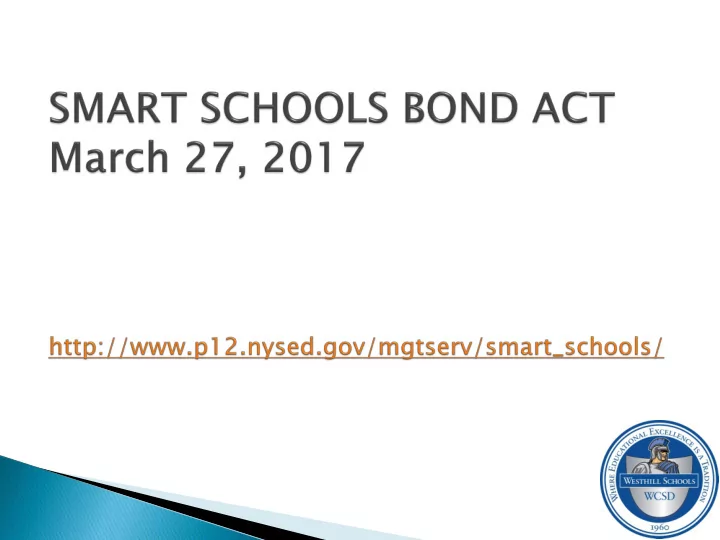

CONTENTS Smart Schools Bond Act Committees and the Smart Schools Investment Plan Smart Schools Timeline Smart Schools Investment Plan budget and required actions
SMART SCHOOLS BOND ACT • The SMART SCHOOLS BOND ACT OF 2014 (SSBA) was passed in the 2014-15 Enacted Budget and approved by the voters in a statewide referendum held during the 2014 General Election on Tuesday, November 4, 2014. The SSBA authorized the issuance of $2 billion of general obligation bonds. • The Westhill Central School District allocation is $1,076,116 . • The Smart Schools Bond Act requires that school districts develop and receive approval of a Smart Schools Investment Plan (SSIP) from the Smart Schools Review Board.
THE PURPOSE OF THE SMART SCHOOLS BOND ACT 1. Install high-speed broadband or wireless internet connectivity for schools and communities; 2. Acquire learning technology equipment or facilities, including but not limited to interactive whiteboards, computer servers, and desktop, laptop, and tablet computers; 3. Construct, enhance, and modernize educational facilities to accommodate pre-kindergarten programs and to provide instructional space to replace classroom trailers; and/or 4. Install high-tech security features in school buildings and on school campuses, including but not limited to video surveillance, emergency notification systems, and physical access controls. The Westhill Central School District’s planned uses are underlined.
SMART SCHOOLS BOND ACT TECHNOLOGY EXPENDITURES ALLOWABLE NON ALLOWABLE • • Interactive white boards Software • • Computer servers Subscription services • • Desktop, laptop, tablet Professional development • • Other technology items that IT salaries and benefits • enhance teaching and learning Payments to BOCES • Infrastructure improvements, i.e. wireless
SMART SCHOOLS BOND ACT NON-PUBLIC SCHOOLS (PARKVIEW) • The Smart Schools Bond Act requires that school districts must loan, upon request, any classroom technology purchased by the district with Smart Schools Bond Act funding to students attending nonpublic schools within the same school district. The lending school district would retain ownership of the devices and responsibility for maintenance and repair. • No school district may be required by the Smart Schools Bond Act to loan technology in amounts greater than that obtained under the Smart Schools Bond Act. • No school district may loan Smart Schools Bond Act classroom technology in an aggregate amount greater than two hundred and fifty dollars ($250) multiplied by the nonpublic school enrollment in the base year at the time of enactment (e.g., 2014-15 enrollment).
SMART SCHOOLS BOND ACT IMPACT ON THE PROPERTY TAX CAP • Expenditures for approved Smart Schools Projects will not affect a school district’s Tax Levy Limit pursuant to Education Law § 2023-a, often referred to as the "Property Tax Cap .“ • In calculating the Tax Levy Limit, school districts should not include in Capital Local Expenditures any approved Smart Schools Project Expenditures that will be reimbursed with Smart Schools Bond Act funds.
SMART SCHOOLS BOND ACT • Giving consideration to the district’s: Strategic Plan, Technology Plan, and Building Condition Survey; on January 9, 2017, the Board of Education approved a proposal by King & King Architects to provide architectural services for district-wide security enhancements. And, established a Smart Bond Planning Committee made up of: Administrators Community members Parents Staff Students
SMART SCHOOLS BOND ACT • The Smart Bond planning committees considered the preliminary proposals from the district’s administration, provided comments and are in agreement with the recommendation before the Board of Education to: 1. Upgrade the district’s wireless and hard wired network infrastructure to support increased demand from additional devices and leverage the benefits of a wireless upgrade for accessing online resources. 2. Upgrade district security devices to provide a safer and more secure district learning environment. 3. Purchase additional Chromebooks to expand student access to personal devices in the classrooms in order to: a. increase access to computers for all students, b. help address gaps for students who lack computer access at home and support the use of wireless technology for access to resources, c. and help assess future technology replacement needs as per the district’s technology plan and ongoing assessments; 4. The district’s general fund will supplement the Smart Schools Bond Act through professional development, technical support, and a sustainability plan to support recurring costs.
SMART SCHOOLS BOND ACT TIMELINE • Have already presented, obtained, and incorporated comments on the draft Smart School Investment Plan draft from: Parkview Academy (non- public), the technology committee, parents, and students. • Board of Education approves the preliminary Smart School Investment Plan at its regular meeting on March 27, 2017. • Post the Smart School Investment Plan on district website for 30 days. • Hold a public hearing before the Board of Education meeting on May 9, 2017. • If no material comments are received from the community, it will be recommended that the Board of Education adopt the Smart Schools Investment Plan at its regular meeting on May 16, 2017. • Finalize the Smart Schools Investment Plan Template online. • Westhill Central School District’s new security camera system and wireless project will require approval from the Office of Facilities Planning.
Item/Description Extended Cost Chromebooks & carts $ 36,200 District Wide Wireless $ 305,029 District Wide Security Cameras $ 734,887 Total $1,076,116
QUESTIONS
Recommend
More recommend